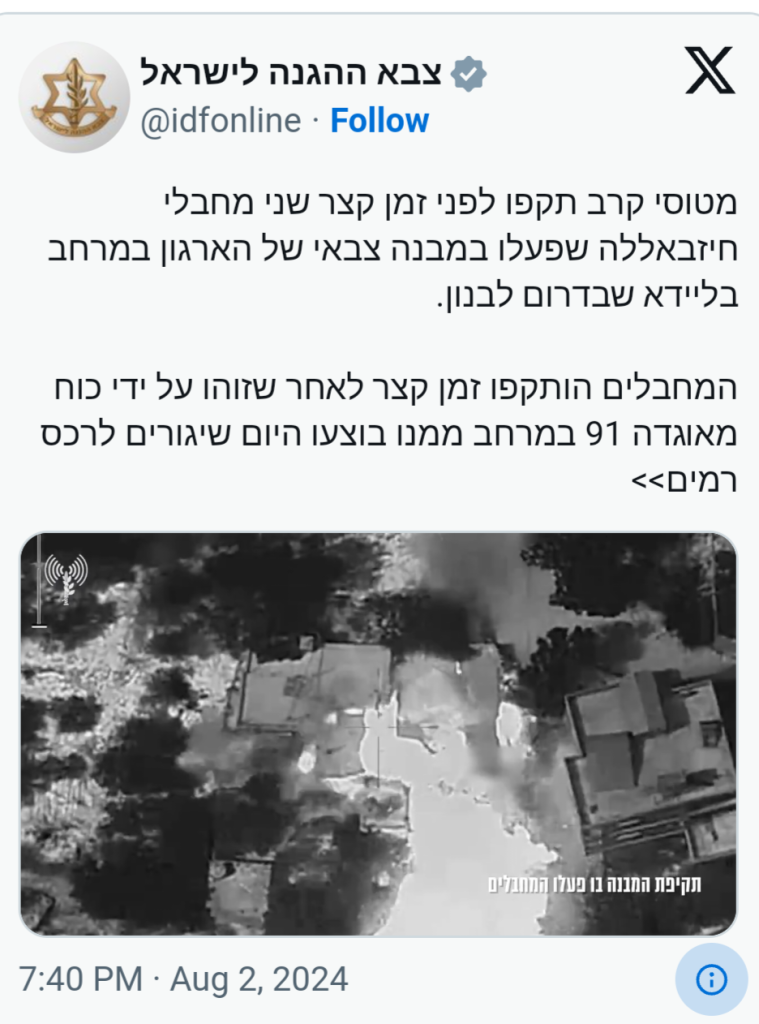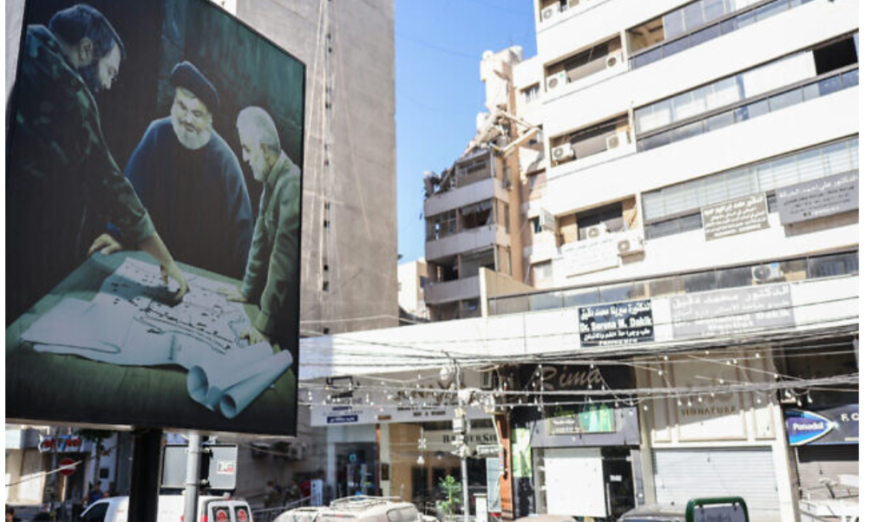A billboard displaying an image of late Iranian Quds Force chief Qasem Soleimani (R) and Hezbollah leader Hassan Nasrallah (C) stands in front of a building targeted in an Israeli military strike on a Hezbollah commander in Beirut the previous day, on July 31, 2024 (ANWAR AMRO.)
.
Hezbollah is evacuating its senior personnel from the terror group’s strongholds in the southern suburbs of Beirut, in anticipation of potential Israeli strikes, Arabic media sources reported Friday
The Iran-backed group has also reportedly moved the military equipment it stored to areas further away from the Lebanese capital.
The reported move came as the region braces for a potential escalation after the assassinations this week of top Hezbollah military commander Fuad Shukr in Beirut and Hamas leader Ismail Haniyeh, whose killing in Tehran has been widely blamed on Israel.
While the IDF has claimed responsibility for killing Shukr, Israel has not officially commented on the assassination of Haniyeh.
Iranian and Hamas leaders vowed to take revenge against Israel for Haniyeh’s killing during funeral ceremonies in Tehran and Doha on Thursday and Friday. Hezbollah’s leader Hassan Nasrallah said that the war against Israel had entered a “new phase” and Israel should expect “rage and revenge.”
However, the US has not yet received any indication that Iran is preparing for a military strike on Israel, the Saudi Al-Hadath news outlet reported, citing unnamed sources from within the Biden administration.
According to the report, US intelligence has not detected any significant movement of Iranian forces or equipment in recent days, and for now, there are no signs that the country is gearing up for an imminent strike on Israel.
One of the US officials told Al-Hadath that Washington estimated that “Tehran will take time to decide on the type of response it launches, and it will take time to prepare the response.”
The unnamed official said that Iran does not want war with Israel any more than Israel wants war with it, and that therefore the attack was not likely to be a large-scale assault.
“But,” they said, “you are dealing with the Middle East, and anything can happen.”
In Israel, government ministers have been issued satellite phones in preparation for possible retaliation, the Ynet news site reported.
According to the report, the satellite phones were distributed due to concerns that a retaliatory attack by either Iran or Hezbollah, or both, could destroy telephone lines and knock out cell service.
Some ministries have also provided staff with satellite phones as well, the report added, but stressed that “there should be no panic,” as the step was taken out of an abundance of caution and not because any specific intelligence information indicated that telephone infrastructure will be destroyed or damaged.
Meanwhile, the skirmishes on the northern border continued Friday with rocket fire and drones launched by Hezbollah, and Israeli fighter jets struck two Hezbollah operatives in a building in southern Lebanon’s Blida, the IDF said.
The military said the operatives had been identified by the 91st “Galilee” Regional Division at an area from which projectiles were fired at the Ramim Ridge earlier Friday.
Additionally, a suspected drone that entered Israeli airspace from Lebanon was shot down over the Golan Heights. A fire was sparked in the area as a result of falling shrapnel. There were no injuries in the incident.
Hezbollah also took responsibility for launching several rockets at an Israeli military base on the Lebanon border. Sirens had sounded in the community of Arab al-Aramshe, close to the base that Hezbollah claimed to have targeted. There were no injuries.
Reservists of the Oded brigade spotted the operative behind the attack, and a short while later a drone struck him, the IDF says.
Speaking to troops in Gaza on Thursday evening, IDF Chief of Staff Lt. Gen. Herzi Halevi said Israel is “willing to go far” to strike those who harm the country.
“Those who attack the citizens of Israel, those who attack the State of Israel, we are ready to go far, we know how to make great efforts to bring very accurate intelligence, to attack, kill and also take risks,” Halevi told troops.
“We attacked in Beirut and we are attacking in Gaza, and we will be very strong in defense, and then we will also attack very strongly,” he said.
The Israel Defense Forces on Thursday said it was on “high alert” as the country braces for a response to the assassinations, but its spokesman pledged that the military knows how to handle any threat.
Spokesman Rear Adm. Daniel Hagari said that “the IDF is on high alert, both in defense and in attack. IDF troops are deployed in the air, at sea, and on the ground, and are ready for any scenario, and especially with plans to carry out attacks in the immediate timeframe.”
He emphasized, however, that Israel’s defenses are “not hermetic.”
In addition to increased aerial patrols, dozens of Israeli Air Force fighter jets were waiting on tarmacs, ready to launch an attack or defend against one, a Channel 12 TV report said.
Prime Minister Benjamin Netanyahu, meanwhile, spoke with US President Joe Biden, who the White House said stressed America’s commitment to defending Israel’s security “against all threats from Iran.” The two discussed new US military deployments to protect against possible attacks from ballistic missiles and drones.
The allied leaders’ phone call came as Israeli television reported that Israel was working to finalize the coordination of a regional and international coalition to thwart a potential response by Iran and Hezbollah to the killings of Haniyeh and Shukr, as was the case when Iran fired hundreds of drones and missiles at Israel on April 13-14.
And Defense Minister Yoav Gallant met with his British counterpart, UK Secretary of State for Defense John Healey on Friday.
A readout from the Defense Ministry said Gallant provided Healey with an “operational situation assessment.”
The pair “discussed the important defense ties between Israel and the UK, and their shared commitment to maintaining and further strengthening cooperation in a number of strategic and military areas, including the field of intelligence.”
“Gallant expressed his appreciation to the secretary for Britain’s ongoing support for Israel’s right to self-defense, and the important defense cooperation that took place when Israel was under attack in April,” the statement continued.
“In light of recent developments, Minister Gallant discussed the IDF’s readiness and capabilities to defend Israel on all fronts, and emphasized the importance of establishing a coalition in Israel’s defense against Iran and its proxies. This would have a critical impact on regional and global security and stability,” the ministry said.
The two also discussed the war in the Gaza Strip, according to the readout.
Meanwhile, Halevi met with his British counterpart, Chief of the Defense Staff Adm. Sir Antony David Radakin.
The IDF said the pair “held a situational assessment in which they discussed strategic security issues and cooperation in the region.”
The United Kingdom was among several nations that aided Israel in defending against Iran’s attack on the country in April. Healy and Radakin visited Israel along with British Foreign Secretary David Lammy.

xxxxxxxxxx.

